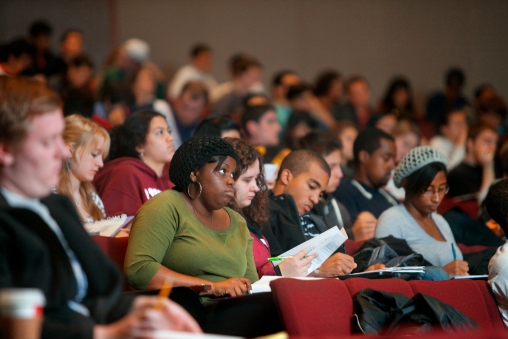YOUR IMPACT
Engineers are getting down to business

Students in the Financial Accounting course, which is one of the four fundamental courses taken by engineers enrolled in the business minor.
Building a better mousetrap is one thing, but revolutionizing the mousetrap industry is quite another. After all, for every iPhone or Droid, there are several Apple Newtons or Iridium phones – technological innovations that failed in the marketplace because of poor planning, overhyped technology or failure to gauge public tastes accurately.
Historically, few young engineers, even those graduating from top programs like Cornell's, have had a solid training in business. For Cornell engineers, however, that is changing. Inspired by an initial investment for a pilot program and now secured with a $7 million endowment, College of Engineering students have the opportunity to complement their technical education with a minor from a top undergraduate business program. The only other Ivy League engineering program to offer a similar business curriculum is the University of Pennsylvania.
The minor, which was launched in the 2007-08 academic year with the goal of offering practical business instruction to science and engineering students, is offered through the Charles H. Dyson School of Applied Economics and Management in the College of Agriculture and Life Sciences and produced its first graduates in May 2008.
"The Business Minor for Engineering Majors addresses a growing demand on the part of engineering students for business-related courses," says Lance R. Collins, the Joseph Silbert Dean of the College of Engineering. "I see it as nothing less than a means to ensure that Cornell-educated engineers are like few others – uniquely prepared to be innovative technical problem solvers but with a solid grounding of business knowledge."
The anonymous alumnus who envisioned and endowed the minor asserts that the most successful engineers he hires have "a real understanding of the entire process of how a product actually gets to market and is useful to society."
"We are grateful for the thoughtful and generous investment of the anonymous donor who is making this gift," says Kathryn Boor, the Ronald P. Lynch Dean of Agriculture and Life Sciences. "He has a keen understanding of the challenges in engineering, manufacturing and business, and a clear and compelling vision for providing Cornell students with the instruction and opportunity they need for careers of value and impact."
Students pursuing the minor take four fundamental courses – Introduction to Business Management, Marketing, Finance and Financial Accounting – to complement courses identified in the College of Engineering. They also have the option of taking a capstone course that involves team-based, hands-on experiential learning, and also the chance to collaborate with non-engineering majors.
Deborah Streeter, the Bruce F. Failing Sr. Professor of Personal Enterprise and Small Business, organizes the one-credit capstone course, called Business Lab for Engineers, which takes place over three days during the spring semester.
"Students participate in a sort of simulated economy … The idea is that each of the teams is running a company, and they have to make decisions on everything from marketing budgets to engineering specs," says Streeter.
The capstone course is facilitated by Paul Joseph '91, a self-employed business consultant. Each student team practices bringing a particular product to market, and the decisions they make along the way are run through a simulation program, giving the students quick feedback on the business consequences of their actions and those of the other teams.
"What has impressed me about the Cornell students is their diligence in trying to understand not just how the simulation works, but really the relevance in a business context," says Joseph.
Thomas Murray '10, a consultant in the emerging technologies and business strategy group of Navigant Consulting, says he uses the knowledge he gained through the business minor "every day."
In addition to understanding the technologies themselves, "You have to understand the business, how much does it cost to implement; what is the life cycle cost, and how do you determine the present value of that type of information?" he says.
The reaction among engineering students for the business minor has been positive, with between 60 and 90 students enrolled each year since the program began. The leadership of the Dyson School and the College of Engineering anticipate that the business minor will increasingly attract other science-based majors.